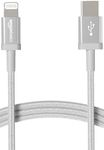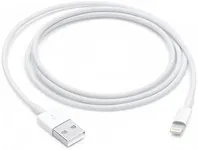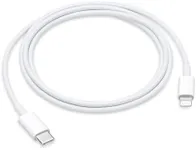Best iPhone Charger Cables
From leading brands and best sellers available on the web.
Anker
Anker iPhone Charger Cable, Powerline III Lightning Cable 6 Foot iPhone Charger Cord MFi Certified for iPhone 11 Pro Max, 11 Pro, X, Xs, Xr, Xs Max, 8, 8 Plus, 7 and More, Ultra Durable (White)

SYNCWIRE
Syncwire USB C to Lightning Cable [Apple MFi-Certified 3ft] iPhone 12 Fast Charger Cable Nylon Braided for iPhone 13/12/11 Pro/X/XS/XR / 8 Plus/AirPods Pro, Supports Power Delivery - Black
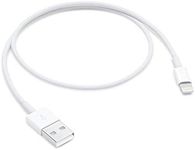
Apple
Apple Lightning to USB Cable (2 m)

Belkin
Belkin USB-C to Lightning Cable (iPhone Fast Charging Cable for iPhone 8 or later) Boost Charge MFi-Certified iPhone USB-C Cable, 3ft/1m, White, Model Number: CAA003bt1MWH
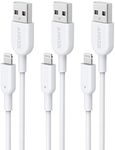
Anker
10%OFF
Anker Lightning Cable(3-Pack), Powerline II [3ft MFi Certified] iPhone Charger Cable/Sync Lightning Cord Compatible with iPhone SE 11 11 Pro 11 Pro Max Xs MAX XR X 8 7 6S 6 5, iPad and More

Belkin
Belkin BoostCharge Pro Flex Braided USB Type A to Lightning Cable (1M/3.3FT), MFi Certified Charging Cable for iPhone 14, 13, 12, 11, Pro, Max, Mini, SE, iPad - White

Belkin
Belkin BoostCharge Flex Silicone USB-A to Lightning Cable (2M/6.6FT), MFi-Certified Charging Cable for iPhone Series with Cable Clip - White

Belkin
Belkin Braided USB C to Lightning Cable MFi Certified iPhone Fast Charger Type C Compatible with iPhone 13, 12, 11, Pro, Pro Max, Mini, iPad, AirPods, and Other Lightning Devices 3.3FT/1M (White)

Belkin
Belkin BoostCharge Lightning Cable - 6.6ft/2M - MFi Certified Apple iPhone Charger USB to Lightning Cable - iPhone Cable - iPhone Charger Cord - Apple Charger - USB Phone Charger - Black
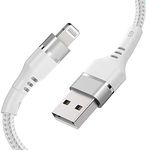
![Syncwire iPhone Car Charger - Upgrade [Apple MFi Certified] 4.8A/24W Car Charging Adapter with Built-in Coiled Lightning Cable for Apple iPhone 14/13/12/11/Xs/XS Max/XR/X/8/7/6 Plus, iPad & More](https://images-proxy.bestreviews.guide/98NfNXKLxh0T9VoBjcPCPNPMStE=/0x150/https://m.media-amazon.com/images/I/41vFUNVQNmL._AC_CX679_.jpg)
